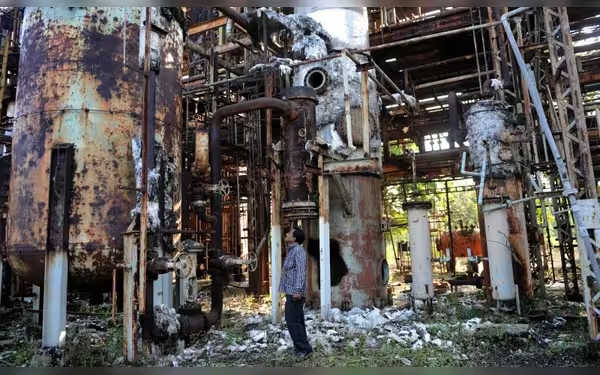Sunday, December 22, 2024 08:17 PM
Bhopal Gas Disaster: Four Decades of Tragedy and Resilience
- Bhopal gas leak caused thousands of casualties.
- Survivors continue to face health complications.
- Call for improved industrial safety regulations.
 Image Credits: dawn.com
Image Credits: dawn.comThe Bhopal gas disaster remains a haunting reminder of industrial negligence, affecting survivors and demanding justice four decades later.
On the night of December 2, 1984, a catastrophic event unfolded in Bhopal, India, that would forever change the lives of thousands. A gas leak from the Union Carbide pesticide plant released a deadly cloud of methyl isocyanate, a highly toxic chemical. This disaster is often referred to as the Bhopal gas tragedy, and it is considered one of the worst industrial accidents in history. In the blink of an eye, the lives of many were turned upside down, and the effects of that night are still felt today, four decades later.
As the gas spread through the air, people were caught off guard. They were unaware of the danger lurking in the night. Among them was a woman named Devi, whose cries for help were lost amid the chaos. Families fled their homes, desperately trying to escape the invisible threat. Tragically, many did not make it out in time. The immediate aftermath was devastating, with thousands suffering from severe health issues, and many lives lost.
Fast forward to today, and the impact of the Bhopal gas disaster is still evident. Survivors like Devi continue to live with the physical and emotional scars of that night. Many children born in the years following the disaster have been affected by deformities and health complications, a grim reminder of the toxic legacy left behind. The community has been left to grapple with the long-term consequences, as they seek justice and recognition for their suffering.
The Bhopal gas tragedy serves as a stark reminder of the importance of industrial safety and the need for stringent regulations to protect communities. It raises critical questions about corporate responsibility and the ethical obligations of companies to ensure the safety of their operations. As we reflect on this tragedy, it is essential to advocate for better safety measures and to support those who continue to suffer from its effects.
The Bhopal gas disaster is not just a historical event; it is a continuing story of pain, resilience, and the fight for justice. As we remember the victims and survivors, we must also commit to learning from this tragedy. It is our responsibility to ensure that such a disaster never happens again, not just in India, but anywhere in the world. The lessons learned from Bhopal should guide us toward a safer future for all.













